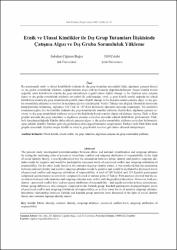Etnik ve ulusal kimlikler ile dış grup tutumları ilişkisinde çatışma algısı ve dış gruba sorumluluk yükleme
Künye
Bağcı Hemşinlioğlu, S. Ç. & Çelebi, E. (2017). Ethnic and national identities: Links to outgroup attitudes via attribution of responsibility and perceived interethnic conflict. Turk Psikoloji Dergisi, 32(80), 63-79.Özet
Bu araştırmada etnik ve ulusal kimliklerle özdeşim ile dış grup tutumları arasındaki ilişki, algılanan çatışma düzeyi ve dış gruba sorumluluk yükleme değişkenlerinin aracı rolü incelenerek değerlendirilmiştir. Sosyal kimlik teorisi ışığında, etnik kimliklerin olumlu dış grup tutumlarıyla negatif yönde ilişkili olacağı ve bu ilişkinin artan çatışma algısı ve dış gruba sorumluluk yükleme seviyeleri ile açıklanacağı; ortak iç grup kimlik teorisi ışığında ise ulusal kimliklerin olumlu dış grup tutumlarıyla pozitif yönde ilişkili olacağı ve bu ilişkinin azalan çatışma algısı ve dış gruba sorumluluk yükleme seviyeleri ile açıklanacağı öne sürülmüştür. Veriler Türkiye'nin değişik illerindeki üniversite kampüslerinde toplanmış, toplamda 320 Türk ve 153 Kürt üniversite öğrencisi arasında sınanmıştır. Yol analizleri sonuçlarına göre, her iki kimlikle özdeşim dış grup tutumlarıyla önerilen yönlerde ilişkili iken, algılanan çatışma seviyesi ve dış grup sorumluluk yükleme seviyesi bu ilişkilerde kısmi aracılar olarak rol almıştır. Ayrıca, Türk ve Kürt gruplar arasında dış grup tutumları ve algılanan çatışma seviyeleri arasında anlamlı farklılıklar gözlenmiştir. Türklerle karşılaştırıldığında Kürtler daha yüksek çatışma algısı ve dış gruba sorumluluk yükleme seviyeleri belirtmiştir. Aynı şekilde, Kürtler Türklere göre dış gruba karşı daha negatif tutumlar sergilemiştir. Türkiye'deki Türk-Kürt etnik gruplar arasındaki ilişkiler sosyal kimlik ve ortak iç grup kimlik teorileri göz önüne alınarak tartışılmıştır. The present study investigated interrelationships between ethnic and national identification and outgroup attitudes by testing the mediating roles of perceived interethnic conflict and outgroup attribution of responsibility. In the light of social identity theory, it was hypothesized that the association between ethnic identity and positive outgroup attitudes would be negative and would be mediated by increased levels of perceived conflict and outgroup attribution of responsibility. On the other hand, based on the common ingroup identity model, it was predicted that the association between national identity and positive outgroup attitudes would be positive and would be mediated by decreased levels of perceived conflict and outgroup attribution of responsibility. A total of 320 Turkish and 153 Kurdish participants completed questionnaires in university campuses located in various parts of Turkey. Path analyses showed that the associations between both identities and outgroup attitudes were in line with the predicted directions. Moreover, both mediators - perceived conflict level and out-group attribution of responsibility - had significant roles in these associations. Ethnic group differences also emerged; compared to the Turkish group, Kurdish participants displayed higher levels of perceived conflict and outgroup attribution of responsibility, as well as lower levels of positive outgroup attitudes. Interethnic relationships between Turkish and Kurdish group members were discussed in the light of social identity theory and common ingroup identity model.


















